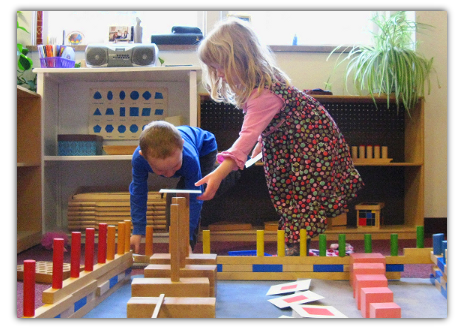Montessori schools, and the Montessori philosophy of education, are named after Dr. Maria Montessori.
Dr. Montessori was an Italian doctor who, after much time teaching children in the ghettos of Rome, developed a revolutionary educational methodology and philosophy, which is now exceptionally popular across the globe.
A Montessori school is a school which conforms to Dr. Montessori’s philosophy and methodology. Be cautious, though: Dr. Montessori never copyrighted her methodology or her name. For this reason, just because a school has the word “Montessori” in its title does not necessarily mean it follows the Montessori methodology, nor does it necessarily mean that the school has been accredited by the American Montessori Society. Do your research before committing to any school.
Montessori Methodology and Philosophy
In theory, Montessori schools may teach children from infancy through high school, but in reality, most only teach up to 8th grade. The vast majority (90%) of Montessori schools are geared towards children aged 3-6.
The basic principle of the Montessori philosophy is children-guided learning. In other words, children choose what they want to learn, and teachers guide the learning process based on that choice. Teachers do not grade students; they simply assess what the child has learned and then guide him or her towards further development and discovery.
Montessori schools seek to better a sense of self-esteem, independence, curiosity, and confidence in children. They encourage students to explore new concepts, to trust and believe in themselves, and to treat others with respect. In distinct contrast to traditional educational methods, in which children are disciplined and forced to adhere to a rigid system of expectations and criteria, Montessori schools respect children as self-directed individuals, while encouraging growth towards social responsibility and independence.
The classrooms in Montessori schools are designed to be open and spacious, with multiple work stations located throughout the room and learning materials easily accessible on wall shelves. Children of multiple age groups are included in a single classroom. This encourages not only individual growth, but social growth as well. Lessons, rather than being delivered to all students at one time, are given to individual students, or to small groups of students, while the rest of the class works on other projects independently.
Students take an active role in planning their schedule and holding themselves accountable for their education, with gentle guidance from the teacher. Classes use a variety of materials to enhance their lessons, such as objects of nature, treasures from distant cultures, stories, Montessori-specific materials, and more.
The Montessori philosophy is inclusive and encourages diversity. Children are taught to behave respectfully and harmoniously with others, to take responsibility for their own actions, and to view themselves as part of a global community. This motivates generosity, understanding, and compassion when interacting with others.

